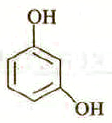Which of the following will not give anisole ?
Phenol is reacted with dimethyl sulphate in the presenc of a base
Sodium phenoxide is treated with methyl iodide.
Diazomethane is reacted with phenol
Methyl magnesium iodide is treated with phenol.
The correct Answer is:D
To determine which of the following options will not give anisole, we will analyze each option step by step.
Step 1: Analyze Option 1 - Phenol + Dimethyl Sulfate
- Reaction: Phenol (C6H5OH) reacts with dimethyl sulfate ((CH3)2SO4) in the presence of a base (e.g., NaOH).
- Mechanism: The hydroxyl group (-OH) of phenol is deprotonated by the base, forming phenoxide ion (C6H5O-). This ion then reacts with dimethyl sulfate to form anisole (C6H5OCH3) and methyl sulfate.
- Conclusion: This reaction will produce anisole.
Step 2: Analyze Option 2 - Sodium Phenoxide + Methyl Iodide
- Reaction: Sodium phenoxide (C6H5O-Na+) reacts with methyl iodide (CH3I).
- Mechanism: The phenoxide ion acts as a nucleophile and attacks the methyl group of methyl iodide, leading to the formation of anisole (C6H5OCH3) and sodium iodide (NaI).
- Conclusion: This reaction will also produce anisole.
Step 3: Analyze Option 3 - Phenol + Diazomethane
- Reaction: Phenol (C6H5OH) reacts with diazomethane (CH2N2).
- Mechanism: The hydroxyl group of phenol reacts with diazomethane, leading to the formation of anisole (C6H5OCH3) and nitrogen gas (N2) as a byproduct.
- Conclusion: This reaction will produce anisole as well.
Step 4: Analyze Option 4 - Phenol + Methyl Magnesium Iodide
- Reaction: Phenol (C6H5OH) reacts with methyl magnesium iodide (CH3MgI).
- Mechanism: In this case, the Grignard reagent (methyl magnesium iodide) reacts with the acidic hydroxyl group of phenol, leading to the formation of a phenyl magnesium alkoxide intermediate. This intermediate will not yield anisole but rather a tertiary alcohol after hydrolysis.
- Conclusion: This reaction will not produce anisole.
Final Answer
The option that will not give anisole is Option 4: Methyl Magnesium Iodide treated with Phenol.
---
- Reaction: Phenol (C6H5OH) reacts with dimethyl sulfate ((CH3)2SO4) in the presence of a base (e.g., NaOH).
- Mechanism: The hydroxyl group (-OH) of phenol is deprotonated by the base, forming phenoxide ion (C6H5O-). This ion then reacts with dimethyl sulfate to form anisole (C6H5OCH3) and methyl sulfate.
- Conclusion: This reaction will produce anisole.
- Reaction: Sodium phenoxide (C6H5O-Na+) reacts with methyl iodide (CH3I).
- Mechanism: The phenoxide ion acts as a nucleophile and attacks the methyl group of methyl iodide, leading to the formation of anisole (C6H5OCH3) and sodium iodide (NaI).
- Conclusion: This reaction will also produce anisole.
- Reaction: Phenol (C6H5OH) reacts with diazomethane (CH2N2).
- Mechanism: The hydroxyl group of phenol reacts with diazomethane, leading to the formation of anisole (C6H5OCH3) and nitrogen gas (N2) as a byproduct.
- Conclusion: This reaction will produce anisole as well.
- Reaction: Phenol (C6H5OH) reacts with methyl magnesium iodide (CH3MgI).
- Mechanism: In this case, the Grignard reagent (methyl magnesium iodide) reacts with the acidic hydroxyl group of phenol, leading to the formation of a phenyl magnesium alkoxide intermediate. This intermediate will not yield anisole but rather a tertiary alcohol after hydrolysis.
- Conclusion: This reaction will not produce anisole.
The option that will not give anisole is Option 4: Methyl Magnesium Iodide treated with Phenol.
Similar Questions
Knowledge Check
Which of the following will not give aldol condensation ?
APhenyl acetaldehydeB2 - MethylpentanalCBenzaldehydeD1 - PhenylpropanoneWhich of the following will give acetone?
AH3C−C≡CHHg+2,H2SO4−−−−−−−−→BCH3−C≡CHB2H6−−−−−→ΘOH,H2OC DHC≡CH+CH3OH→
DHC≡CH+CH3OH→Which of the following will give iodoform ?
ACH3CH2OHBCH3−OH∣CH−PhC D
D
Which of the following does not give an oxide on heating ?
View SolutionWhich of the following will give a pair of enantiomorphs? .
View SolutionWhich of the following reaction will not give methane?
View SolutionWhich of the following will give Hofamann alkene?
View SolutionWhich of the following will give allyl halide?
View Solution
